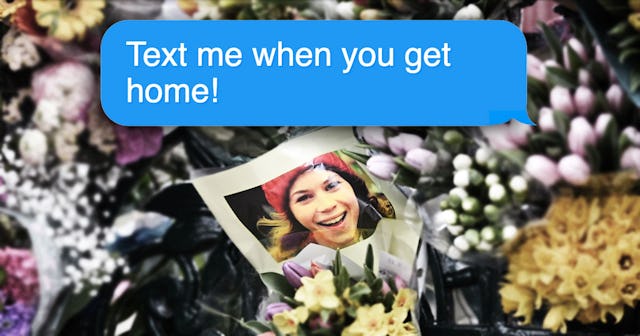We Must Keep Talking About Sarah Everard And #TextMeWhenYouGetHome

#TextMeWhenYouGetHome is a global awareness campaign about violence against women in response to the U.K. murder of 33-year-old Sarah Everard. The marketing executive disappeared on the evening of March 3, 2021 in South London after walking home from a friend’s house at around 9:30 p.m. local time and was reported missing when Everard did not show up to meet her boyfriend the next day. Six days later, a Metropolitan Police officer, Wayne Couzens, was arrested first on suspicion of kidnapping and then later, on suspicion of murder. Her remains were found the next day in a woodland.
MSNBC anchor Alicia Menendez explained in her video what every woman knows: “The story of Sarah Everard is the story of what too many women fear… A reminder that no amount of mindfulness, or personal choices, or sensible shoes, can enable a woman to outrun a system that refuses to prioritize and protect her.”
What is the #TextMeWhenYouGetHome hashtag?
There are so many trending hashtags these days, it can be somewhat difficult to keep track of them. Unfortunately, the concept behind #TextMeWhenYouGetHome is instantly recognizable to trans- and cis-women and non-binary folks the world over.
After all, these are the words we say to our friends before parting — to comfort us as we let each other go into the night. We say that even if we’re driving away in our own cars — because who knows what could happen — whether we’re one flat tire on the side of the road or accident away from disappearing.
In what kind of world do we live in where we have to reassure each other that we’ve arrived home safely? Where a female presenting person is not guaranteed to walk home in safety, without threat or fear? Where police put the onus of safety on women — and not men at large.
“I don’t even know how to word this because I feel like my words can’t do justice to how many women are feeling right now,” said @lucymountain in an Instagram post. “I haven’t been able to stop thinking about Sarah Everard and how a woman was not allowed to walk home. It’s unbearable.”
Why does #TextMeWhenYouGetHome resonate with women everywhere?
Many people have explained that Everard did everything “right.” She wore bright clothing and shoes, left well before midnight, took well-traveled and well-lit streets, and spoke to her boyfriend on the phone as she walked home.
Women are particularly shaken because we do everything we can to ensure that our friends know who and where we are meeting, send itineraries, and set check-in times so friends can call the police right away if we go missing. We casually drop information to dates and taxi drivers that our roommates or family members are expecting us at a certain time so that they know we’re not alone; we are not expendable. We will be missed.
There is no safe space for women
The other day, a friend told me how she had given her 11-year-old daughter some pepper spray and taught her how to use it. When her husband found out, he was concerned, saying that if she felt her daughter was going somewhere that may require pepper spray, perhaps she shouldn’t be going there? And maybe that they should have given their daughter a longer talk about general safety versus just showing her how to operate the pepper spray?
Niall Carson/PA Images/Getty
My friend just seethed and nodded. As if she hadn’t been teaching her daughter since birth how to stay safe, how to live in this world that treats women — especially Asian women — as disposable and prey. As if there were any place safe in this world to go as a girl or woman. As if this imaginary place existed.
Men, since you might not listen to women, take a cue from my friend Jeff Harry as he gives suggestions on how to be a good ally.
It’s infuriating that here we are, in 2021, still not being believed for our lived experiences, still needing to put together ad hoc safety nets, and still angry. What amount of money do you want to bet that if this was something that affected the safety of white men, this would have never been a problem in the first place?
Until then, we’ll just have to rely on a hashtag.
This article was originally published on